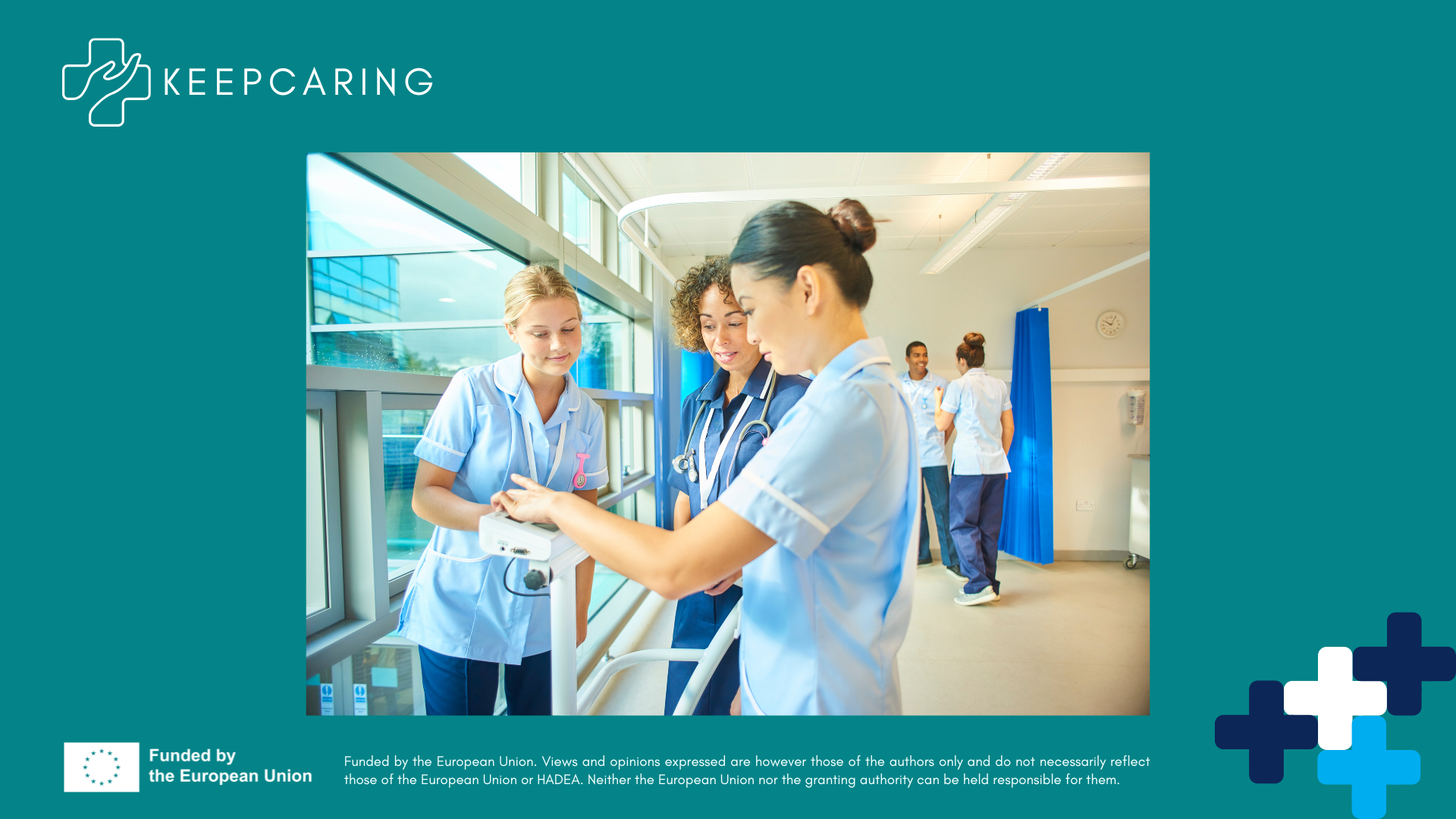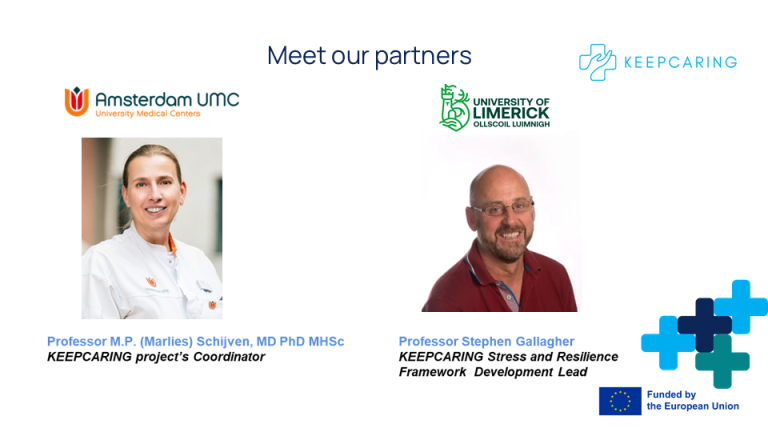Frontline Nurses Mental Health & Wellbeing

Authors
Paul De Raeve, Secretary General at the European Federation of Nurses Association
Manuel Ballotta, Policy Advisor at the European Federation of Nurses Association
Fatima Pereira, Project Manager at the European Federation of Nurses Association
Frontline nurses are hitting rock bottom
Across Europe, nurses’ shortages are placing an increasing mental burden on the nursing workforce. A recent report from the European Agency for Safety and Health at Work (EU-OSHA, 2024) shows that nearly half (44%) of healthcare workforce in Europe reported experiencing acute stress, while 37% faced anxiety. The report also found that 33% of healthcare professionals in the sector experience depression, while 36% suffer from moderate to severe insomnia and sleep disturbances. The net result is that nurses are hitting their breaking point, with many who are already walking away desperately from the nursing profession and even the healthcare sector.
Among the most evident reasons we find the lack of support by governments and policymakers, who continue to cut healthcare budgets, leaving frontline nurses exhausted, unsupported, and struggling to keep up with quality and safety. Furthermore, violence, staff shortages, and unrealistic workloads, lead every shift to being a battle for frontline nurses, resulting in physical and emotional exhaustion, which make it impossible for nurses to stay in the nursing profession. If nothing concrete is done, the global nursing shortage will hit 13 million by 2030 (WHO).
The European Commission’s research response: KEEPCARING
The EFN is a partner in the European Commission funded KEEPCARING project, which aims at supporting the resilience of the nursing workforce by focusing on reducing stress and preventing burnout among healthcare professionals in EU hospital settings. The project will do this by combining non-digital, digital, and AI-driven solutions to address individual, team, and organizational stressors. By co-creating innovative interventions, KEEPCARING aims to foster a healthier, more resilient healthcare workforce ensuring better care for patients and more sustainable healthcare systems.
As an example of a non-digital intervention, we can find the Co-work design intervention lead by Erasmus University Rotterdam, which will look into Prosocial Job Crafting to support teams of nurses in the EU. With regards to digital and AI-driven interventions, we can find the biobehavioural observational monitoring study led by the NOVA University, or the co-created AI-driven Change Management Platform (CMP) which will be developed by NURO. These are just some of the interventions which will be developed and implemented.
KEEPCARING therefore represents a positive attempt towards strengthening the frontline resilience of the nursing workforce. However, for its achievements to be concretised over the short, medium and long term, even beyond the project’s end in 2028, outcomes will needs to become hand-in-hand with an EU regulatory and political framework that looks at frontline nurses not just as a cost, but as a societal and economic investment, as emphasised by the theme for International Nurses Day 2025: ‘Our Nurses. Our Future. Caring for nurses strengthens economies.
To do this, we must tackle some structural challenges affecting the nurses’ well-being, including those to the digitalisation of healthcare systems, in order to ensure that the achievements of KEEPCARING can be reproduced across the EU and Europe, bringing tangible improvements to as many nurses as possible.
Ensuring that the achievements of KEEPCARING will lead to concrete improvements for the nursing workforce – a supportive EU regulatory and political framework for the nurses’ wellbeing and for healthcare digitalisation
First, healthcare settings face budget constraints, which are seriously limiting AI development, implementation, and accessibility, as healthcare systems are focusing on short-term return on investment. This needs to be changed at EU level through the upscaling of the Recovery and Resilience Facility (RRF), for which the European Commission has mandated 20% to be allocated to digitalisation. The Multiannual Financial Framework is another financial policy EFN is following closely as both mechanisms (RRF & MFF) are key sustainability investments that can upscale concrete improvements to the workflow of frontline nurses and allied healthcare professionals, tackling the structural challenges needed.
Importantly, however, such investments in digitalisation and AI should not come at the expense of direct investments in health workforce capacity building a development. In fact, the baseline to ensure the frontline nurses well-being is having a highly educated and trained nursing workforce, in line with the minimum education and training requirements established in the Directive 2013/55/EU (4.600 hours of theoretical and clinical training, the duration of the theoretical training representing at least one third and the duration of the clinical training at least one half of the minimum duration of the training). This must also be ensured by upscaling the RRF and MFF for health workforce capacity building and development. Importantly, this will be supported in KEEPCARING by the Co-work design intervention, which will research how a frontline nurse may engage in prosocial task crafting by taking on advanced tasks and roles that support interprofessional collaboration.
This, together with high-quality Continuing Professional Development (CPD), will be key to ensure that frontline nurses have the adequate digital skills necessary to feel confident in the implementation of digital tools, including AI. Furthermore, as these same nurses will be responsible for collecting the patients’ data that will be used to develop AI tools, it will ensure the quality of the data, improving trust in the accuracy and reliability of AI algorithms, especially for high-stakes nursing and medical decisions.
On the more technical side, the lack of interoperability must be tackled, as disconnected IT tools keeps on increasing the nurses’ workload. Interoperability, although technically feasible according to developers and providers, remains challenging for technological, organisational, and environmental reasons. The incorporation of end-user engagement into health information technology development, implementation, policy, and standard deployment will support interoperability advancement. KEEPCARING has attempted to do this through the CMP co-creation events, and such approach should be followed across the board.
Furthermore, we need to promote the integration of the medical devices, streamlining of workflows, visualisations of data for accessibility, allowing nurses to feel a positive impact on their frontline workload. This is particularly evident in the case of EHR systems, which currently lack standardisation, hindering seamless data and AI integration. To fix this, International Classification for Nursing Practice (ICNP) language must be fully integrated in the EU Electronic Health Data Space (EHDS) during its implementation. This will ensure quick and simple integration of healthcare digital tools, reducing the time nurses need to spend on implementing new tools.
Conclusion
Protecting the frontline nurses well-being is crucial for patients’ safety and quality of care, and the European Project KEEPCARING is playing a crucial role for this. However, this will need to come hand-in-hand with adequate regulatory and political developments in the EU and Europe, which will ensure trust and frontline support for digital and AI healthcare, and ensure the long-term exploitation of KEEPCARING’s achievements.





